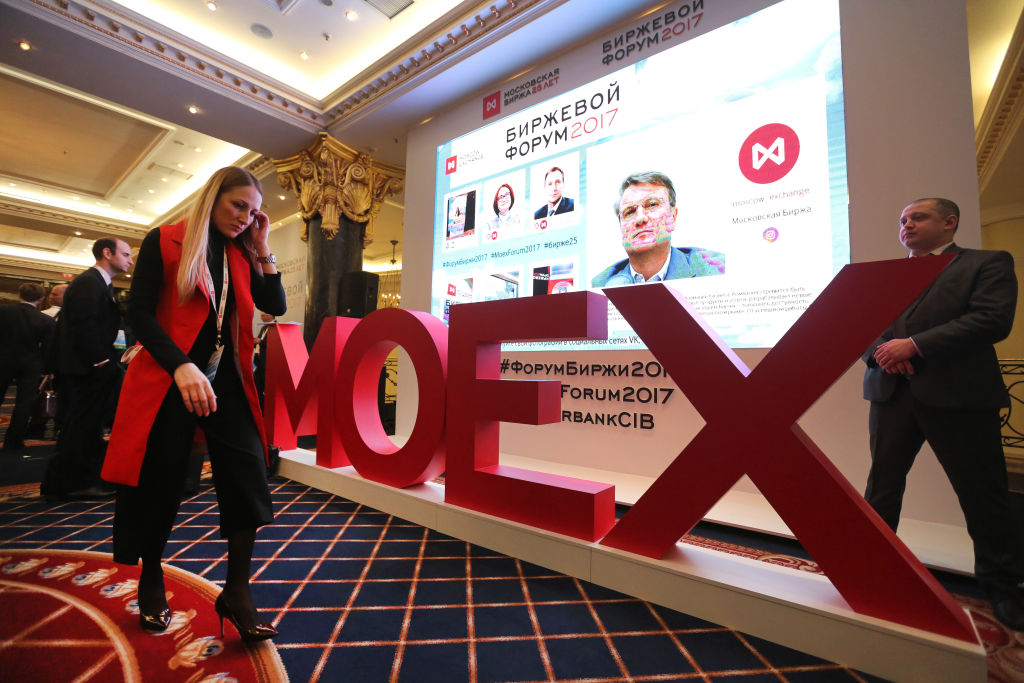Russia partially opens stock market for 1st time since Ukraine invasion. U.S. calls reopening 'a charade.'


A free daily email with the biggest news stories of the day – and the best features from TheWeek.com
You are now subscribed
Your newsletter sign-up was successful
Russia's stock market partially reopened Thursday for the first time since Russia's central bank shut it down to halt dizzying losses after Russian President Vladimir Putin sent Russian missiles and troops into Ukraine. The U.S. and other countries have slapped punishing sanctions on Russia, frozen its foreign reserves, and enacted other financial measures since Russia's stock market was suspended Feb. 25, and the Russian ruble has sunk precipitously.
Russia's benchmark MOEX index rose as much as 10 percent in early trading, but "the increase is unlikely to be interpreted as a sign that all is well with the Russian economy," The Wall Street Journal explains. For one thing, "only 33 shares out of 50 shares on the index were allowed to trade. To prevent a steep selloff, Russia's central bank banned short selling, and blocked foreigners, who make up a huge chunk of the market, from selling their shares. The Kremlin also directed a Russian sovereign wealth fund to buy around $10 billion in shares."
White House Deputy National Security Adviser Daleep Singh dismissed Russia's "Potemkin market opening" as "a charade." Between the Kremlin "artificially propping up the shares of companies that are trading" and prohibitions on short selling and foreigners selling their shares, this is "not a real market and not a sustainable model — which only underscores Russia's isolation from the global financial system," he wrote.
The Week
Escape your echo chamber. Get the facts behind the news, plus analysis from multiple perspectives.

Sign up for The Week's Free Newsletters
From our morning news briefing to a weekly Good News Newsletter, get the best of The Week delivered directly to your inbox.
From our morning news briefing to a weekly Good News Newsletter, get the best of The Week delivered directly to your inbox.
A free daily email with the biggest news stories of the day – and the best features from TheWeek.com
Peter has worked as a news and culture writer and editor at The Week since the site's launch in 2008. He covers politics, world affairs, religion and cultural currents. His journalism career began as a copy editor at a financial newswire and has included editorial positions at The New York Times Magazine, Facts on File, and Oregon State University.
-
 What are the best investments for beginners?
What are the best investments for beginners?The Explainer Stocks and ETFs and bonds, oh my
-
 What to know before filing your own taxes for the first time
What to know before filing your own taxes for the first timethe explainer Tackle this financial milestone with confidence
-
 The biggest box office flops of the 21st century
The biggest box office flops of the 21st centuryin depth Unnecessary remakes and turgid, expensive CGI-fests highlight this list of these most notorious box-office losers
-
 Did markets’ ‘Sell America’ trade force Trump to TACO on Greenland?
Did markets’ ‘Sell America’ trade force Trump to TACO on Greenland?Today’s Big Question Investors navigate a suddenly uncertain global economy
-
 TikTok secures deal to remain in US
TikTok secures deal to remain in USSpeed Read ByteDance will form a US version of the popular video-sharing platform
-
 Unemployment rate ticks up amid fall job losses
Unemployment rate ticks up amid fall job lossesSpeed Read Data released by the Commerce Department indicates ‘one of the weakest American labor markets in years’
-
 Texas is trying to become America’s next financial hub
Texas is trying to become America’s next financial hubIn the Spotlight The Lone Star State could soon have three major stock exchanges
-
 What a rising gold price says about the global economy
What a rising gold price says about the global economyThe Explainer Institutions, central banks and speculators drive record surge amid ‘loss of trust’ in bond markets and US dollar
-
 US mints final penny after 232-year run
US mints final penny after 232-year runSpeed Read Production of the one-cent coin has ended
-
 Warner Bros. explores sale amid Paramount bids
Warner Bros. explores sale amid Paramount bidsSpeed Read The media giant, home to HBO and DC Studios, has received interest from multiple buying parties
-
 Is a financial market crash around the corner?
Is a financial market crash around the corner?Talking Points Observers see echoes of 1929
